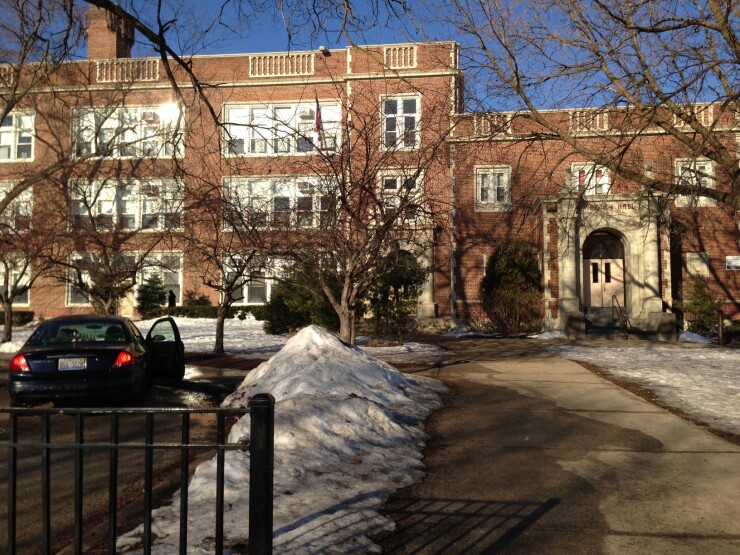Chicago Public Schools tapped Miroslava Mejia Krug, a veteran of top fiscal posts at two Chicago area private higher education institutions, to fill its vacant chief financial officer chair.
The Chicago Board of Education signed off on the appointment at its monthly meeting Wednesday. Krug fills the post left vacant last spring when newly elected Mayor Lori Lightfoot hired Jennie Huang Bennett to lead her financial team.
“In her role as CFO, Miroslava will be responsible for spearheading CPS’ financial strategy to support effective budget planning, maximizing available funds, and ensuring an equitable distribution of resources across the district,” district chief executive officer Janice Jackson said in a letter announcing the addition.

Krug has been chief financial officer at Benedictine University in the Chicago suburb of Lisle since 2016. She previously held the CFO title at Chicago-based Roosevelt University for eight years. She also brings government-related experience to the table having served as deputy CFO and then CFO for the Chicago Housing Authority for five years. Earlier in her career, Krug spent 10 years at United Airlines.
The district said it no longer intends to fill another vacant senior fiscal post. The position of senior vice president of finance was created when then-CEO Forrest Claypool brought Ronald DeNard on board in 2015. DeNard left last year. Walter Stock is a longtime member of the CPS finance team and was elevated over the summer to treasurer and deputy chief financial officer. Heather Wendell is budget director.
While the district's bond ratings remain deep in junk territory, Krug takes over as its finances are on the upswing. The district’s $1 billion structural gap was closed after an infusion of new state operating and pension help under a school funding overhaul approved in 2017 as well as a series of local tax levies to help pay for pensions and capital.
The new funding allowed the district to begin rebuilding depleted reserves — now around $365 million. The newfound calm drove a series of upgrades boosting the district higher on the speculative ratings scale.
But the stability remains fragile as CPS must manage rising tabs for a new teachers’ contract, rising debt costs and big capital spending plans. The district also still relies on costly tax anticipation borrowing to manage cash flow needs.
While the district’s yield penalties on cash flow and long-term borrowing have shrunk, they remain high. The board’s spreads on long-term issuance narrowed on a sale last year by 70 bps to 150 bps over the Municipal Market Data top benchmark compared to a sale last year.
CPS’ most recent upgrade came from Moody’s Investors Service in November when it
“Although revenue and cash have improved, the district's credit profile remains constrained by several factors. The district will face growing costs associated with long-term liabilities and the recent five-year contract with the Chicago Teachers Union that will likely keep reserves thin compared to revenues,” Moody’s wrote.
The board in November signed off on a five-year
The district’s general obligation bonds are rated BB by Fitch Ratings with a stable outlook, and BB-minus by S&P Global Ratings with a positive outlook. Kroll Bond Rating Agency is the sole agency to rate CPS GOs at investment grade with BBB and BBB-minus ratings and a positive outlook.
The district’s A rating from Fitch Rating on its capital improvement tax levy-backed bonds remains on Rating Watch Negative following the Jan. 10 release of Fitch’s revised criteria on tax-supported bonds, Fitch said last week.
Fitch placed 10 ratings on watch negative, seven under "Criteria Observation," and maintained six on watch negative. The criteria now caps tax supported ratings six notches above the general credit of the sponsoring government depending on the insulation of the revenue and linkage. The review was prompted by Puerto Rico bankruptcy-related court rulings that dampen repayment prospects for some revenue debt during court proceedings.
“The placement of ratings on RWN reflects a preliminary assessment that the distance between a security rating and the related general government credit quality is greater than is permissible under current criteria,” Fitch said. Ratings previously placed on watch in reaction to the Court of Appeals for the First Circuit's ruling regarding special revenue bonds included CPS. “Those ratings have the designation Rating Watch Maintained.”
CPS operates 659 schools that serve 361,000 students, making it the third-largest school district in the nation.





